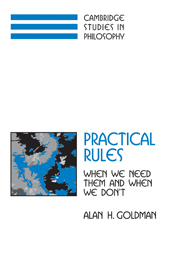Introduction
Published online by Cambridge University Press: 23 July 2009
Summary
“A rule's a rule!” How many of us have been infuriated by hearing these words from some bureaucrat across a desk or government counter? How many have thought such an attempt at justification more appropriate for a robot than a human being? How many take this pat response as a cue to request a supervisor or higher-up who can look through and beyond the rules? On the other side, how many of us have resented administrators who took it upon themselves to ignore rules and make exceptions that we thought unjustified? How many have condemned those who adopt or acknowledge rules only to ignore them later or consider themselves above them? Can both of these reactions be right? That the former reaction is more common begins to indicate that the application of rules is not the norm in sound moral reasoning, at least in difficult or controversial situations. That the latter response also occurs begins to indicate that there are nevertheless circumstances in which agents ought to obey rules even when they regret the outcomes and believe they could do better. The question we face here is “Which circumstances?”
Most philosophers have remained oblivious to this mundane phenomenology. Most, despite the warnings of Aristotle, and perhaps influenced by such hoary texts as the ten commandments, by suspect interpretations of Kant and naive versions of utilitarianism, or by a once dominant picture of theory construction in science, assume that moral reasoning always consists in the application of rules to particular cases.
- Type
- Chapter
- Information
- Practical RulesWhen We Need Them and When We Don't, pp. 1 - 9Publisher: Cambridge University PressPrint publication year: 2001



